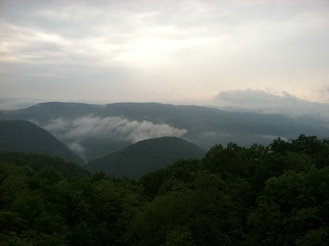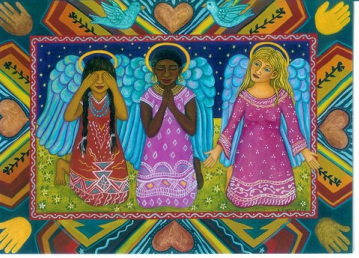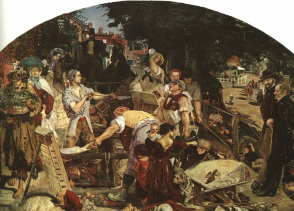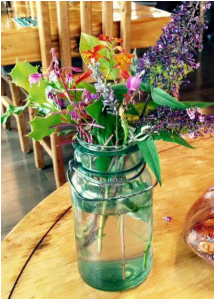
I have been trying to figure out how I ended up at the camp, what led me to sign up for this week in Pipestem, WV. The best that I can recall - about a year ago, I read the Post-Gazette reports about the investigation into the Upper Big Branch mining disaster, and it made me ill - the callous disregard of coal mine owners, particularly Don Blankenship, for the health and well-being of the miners and the mining communities and the "look the other way" practices of publicly funded regulatory bodies made me ill. Shortly thereafter I decided to participate in the March on Blair Mountain, wanting to understand the issues better, wondering if and how they might connect to Western Pennsylvania's own fracking controversies. So I went to Blair Mountain, and then continued to read and listen, and somehow ended up at the Mountain Justice camp in the heart of the Appalachians.
My parents grew up in Harlan County, KY, in the small US Steel-owned coal-mining town of Lynch. They shopped at the company store, and lived in company-owned homes on the clearly socially-stratified main street of town (an old story - it was a little scandalous that my mother, who lived in the No. 6 block, married my father, whose family lived in No. 5). As a child, we visited Lynch often - the smell of the mountains this week took me back immediately to Lynch.
None of my grandparents or uncles worked in the mines, but my dad's cousins and uncles did. I remember stories about black lung disease, and mine injuries. I also remember what I heard a lot about this week - the boom and bust cycle of being a miner. Boys I knew became miners as early as possible - this was in the boom years - and had big cars and married young. A few years later, they were poor. Back and forth, up and down.
My parents lived in Lynch for awhile after they married, then left when my dad decided to go to the University of KY to study engineering. But to my mom, Lynch was "home." So learning - or re-learning - about mountains and mining has pulled at me over the last year in ways that I can't quite understand or explain.
The camp took place at the Appalachian South Folk Life Center - a pastoral setting looking out on breathtakingly beautiful mountains. Each morning, I sat at the top of a hill looking out over the misted mountains, listening to the birds. And all day into the evening I attended workshops about mountain top removal from all angles - Appalachian culture and history, rural vs urban activism, facilitation practices, solidarity economics, non-hierarchical organizing. I was one of only a few folks older than 40 (okay, I was probably the oldest person there), and I had the privilege of learning from much younger people who were either born in some part of Appalachia or have chosen to live and work there, all serving as social justice activists. I don't know what I expected - I don't know that I had any particular expectations - but what I experienced was unexpected.
The people in Mountain Justice, and related groups such as Radical Action for Mountain Peoples' Survival, Coal River Mountain Watch, Larry Gibson's Mountain Keepers, and others, work with community members to understand, monitor, plan, and act to stop the practice of mountain top removal. The movement to stop MTR is based upon the devastating destruction to the ecosystem of the mountains and related long-lasting harm to the physical, communal, social, and emotional lives of community members. There is a substantial body of research documenting the damage done to water systems, wildlife, human health, economic stability, community life.
And yes, the opponents of MTR are allies with others involved in fighting extractive industries, those involved with extracting coal, gas, and oil - with a particular focus on opposing the manner in which the industries operate, again with little regard for the immediate and long-term damage to human life and the ecosystem. So yes, this movement to end MTR is related closely to the efforts in Western PA and elsewhere to stop hydraulic fracturing for natural gas - better known as fracking.
What else did I learn? I got to spend time with people who defined themselves variously as radicals, activists, and anarchists, who question and are committed to swimming upstream against mainstream ideology and against business as usual, when this business hurts people. Today, two groups of campers participated in direct actions - one involving five people who chained themselves to a coal-carrying barge in Charleston, WV (yes, they were arrested) and another involving dozens of people who blocked a road leading up to an MTR site, making it impossible for the trucks that transport coal and other materials to pass through.
And I also learned that I have a whole lot more to think about. Not sure where I fit into this whole scenario, or where I go with what I learned. More later... about people, and food, and music, and stories...




 RSS Feed
RSS Feed
